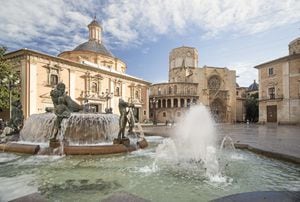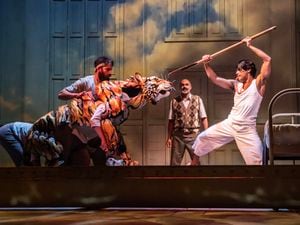Valencia, Spain - travel review
Sitting on Spain's Mediterranean coast, the city of Valencia is a dazzling mix of the old and new.

While its broad beaches and catamaran cruises tempt the sun-seekers, those looking for a bit of culture can delight in the winding streets of the old city, with its Gothic and Baroque chapels, churches and cathedral.
And when the heat gets too much, there are cool bars, cafes and restaurants offering tempting refuge and excellent food that won't break the budget.
You can eat exceptionally well in Valencia for less than 20 euros a head, and 35 euros will buy you a sumptuous meal that will linger long in the memory. At the same time a snack will cost just a couple of euros and a cooling can of Amstel is well worth a euro on a hot day.
Local chefs work wonders with seafood such as turbot, tuna and hake, but the passion here is for paella.
Valencia claims to be the home of Spain's traditional rice dish, and you will find a huge range of different takes on this staple across the city. But in recent years Valencian's have started getting very particular about their paella. Yes, you can have one with seafood, but not mixed with meat and chorizo. The 'real' paella should only have chicken and rabbit, and it's for lunch not dinner. They take their food seriously here. And it is seriously good.
You only have to wander through the Mercado Central - the central market – to discover why Valencia's appreciate good food. The local produce is a treat for the eyes, from huge red peppers and tomatoes to the green lettuces and beautifully ripe purple figs, the arrays of silvery fish, snowy squid and brightly coloured octopus sitting on ice and the dark red hams hanging from the ceiling.
If you can walk out of the market without eating half a dozen things you have too much self-control. It really is a feast for the senses.
Valencia is still somewhat off the beaten track for most British tourists, although that could change this summer as Monarch has started running flights twice a week direct from Birmingham to Valencia, running until the end of September. It means that English isn't widely spoken, although many people have a smattering and hotel staff seem to be fluent, so boning up on a few Spanish basics might be an idea.
Talking of hotels, my brief 52-hour flying visit was spent at The Westin, which proved a cool and classy haven from the searing heat – we turned up during a heat wave. The rooms were huge, the staff attentive and helpful and the beds as comfortable as you could wish. But there are hotels to suit every pocket in this city.
Out and about there is a huge amount to see and do. Valencia's rich history is on display – it was founded by the Romans – with impressive towers from medieval past among a string of sights all within walking distance in the old city. And you could also go by bike; Valencia is a very cycling-friendly city and there are plenty of bike hire shops around. It's a great way to explore the Turia river bed gardens.
The river Turia used to run through the middle of the city but, after one particularly severe flood in the 1950s, it was diverted and the old river bed turned into a long green park that now runs down to the sea. It is always full of activity and is also the home of the incredible City of Arts of Sciences, with its opera house, interactive science museum, Imax theatre and L'Oceanogràfic, the largest oceanographic aquarium in Europe. You can walk through underwater tunnels as sharks swim overhead, watch a family of Beluga whales or the trio of walruses, or enjoy the dolphin show.
Another must-see for families is the Bioparc zoo, a 25-acre park devoted to African wildlife. It aims to create an immersive feel, as if the visitor is surrounded by the animals and their meticulously recreated natural environment. It also allows you to get up close, watching a family of gorillas, a leopard or even a pair of hippos just a few feet away behind reinforced glass. And then there are the giraffes, the elephants, the birds, the zebras, rhinos and, of course, the ever-charming meerkats.
Make sure you have some energy left after a busy day seeing the sights, because Spanish nightlife is something else. People tend to eat late in Spain, often 8pm or even 10pm, and bars provide a constant flow of tapas, wine and good local beer. For those with extra energy, there are a string of nightspots but a favourite during our trip was the beachfront marina nightclub. Entry was free, the drinks were big but expensive – around 10 euros apiece – and dancing went on until well past dawn. Oh, and there were fireworks too.
Valencia is clearing putting a lot of effort into its tourism at the moment and has a lot to offer whether you fancy just a weekend city break or a longer, more leisurely, stay. I'll certainly be going back.




